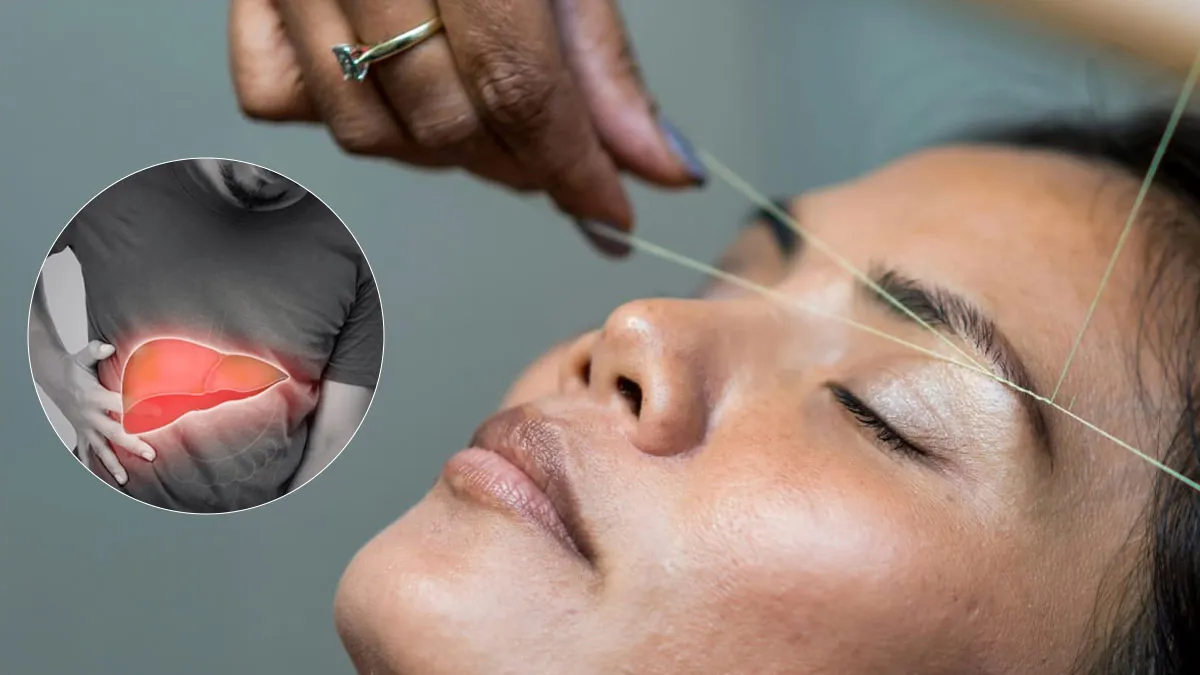
One little mistake might translate to a major health disaster. A visit to the beauty parlour in order to have their eyebrows threaded may look harmless; however, when hygiene is overlooked, it can turn out to be an actual nightmare. It is what happened to a 28-year-old woman who had gone threading, knowing that she ended up with liver failure.
Table of Content:-
Dr Aditij Dhamija shared this shocking case when the woman presented with tiredness, feeling sick in the stomach, and yellow stains in the eye, all of which are the symptoms of liver issues. Examinations revealed that her liver was failing, not in the name of alcohol or medicines but through a visit to a beauty parlour. The culprit? Used threading material, which resulted in minute cuts on her body (near the eye), which enabled the Hepatitis B or C viruses to enter her body.
How Threading Can Be Deadly
View this post on Instagram
Getting threading is a fairly normal beauty treatment, and typically safe. However, when they do not follow the required hygiene or decontamination thread, needles have the potential to spread blood-borne diseases, such as Hepatitis B, Hepatitis C or even HIV. These viruses are transmitted by contaminated blood and even a micro-cut when threading may be the entry point when it comes to infection.
Dr. Aditij Dhamija adds that micronicks permit the gates of the bloodstream to viruses with ease. The situation is aggravated when the thread, hands of the therapist, or other instruments are not washed or disinfected. Infection symptoms do not always manifest suddenly. Fatigue, jaundice (yellow skin and eyes), nausea, or other symptoms may not appear until weeks later, giving way by then to severe damage to the liver.
ALSO READ: Is Boba Tea Habit Putting You at Risk for Cirrhosis? Experts Warn of Fatty Liver Progression
What You Need to Know to Stay Safe![1 - 2025-08-08T154635.675]()
- Insist every time that the beauty technician uses a new, unused thread.
- Select those salons that promise to be very strict about hygiene.
- Make sure that hands and any tools get washed and sterilised prior to the threading process being started.
- Do not thread when you have cuts, infections and wounds in areas around your body.
- In case you develop fatigue, yellowing of eyes or the skin, nausea, or peculiar weakness afterward a salon session, make sure to visit the doctor as soon as you can.
- Beauty should never come at the cost of your health or organs.
- Your share in spreading awareness can protect others from lifelong infections like Hepatitis B, C, and HIV.
Why This Matters![2 - 2025-08-08T154638.884]()
Hepatitis B and C viruses can cause chronic liver infections, which may silently damage the liver over time. Left untreated, these infections can lead to cirrhosis or even liver failure. Unlike alcohol or drug-induced liver disease, infection through procedures like threading isn’t widely known but is a real danger when hygiene is ignored.
Preventing infection is simple: choose salons carefully, speak up for your safety, and get tested if you suspect exposure.
ALSO READ: 10 Everyday Foods That Could Make or Break Your Liver Health, According To a Harvard Doctor
Conclusion
Threading is a popular beauty practice, but safety depends on hygiene. Reusing a thread or ignoring cleaning protocols can spread serious blood-borne viruses that harm the liver. The story shared by Dr Aditij Dhamija of a woman who suffered liver failure after threading is a wake-up call. Protect yourself and your loved ones by insisting on clean tools and reporting any early symptoms. Your caution can stop a small cut from becoming a major health crisis.
Also watch this video
How we keep this article up to date:
We work with experts and keep a close eye on the latest in health and wellness. Whenever there is a new research or helpful information, we update our articles with accurate and useful advice.
Current Version

